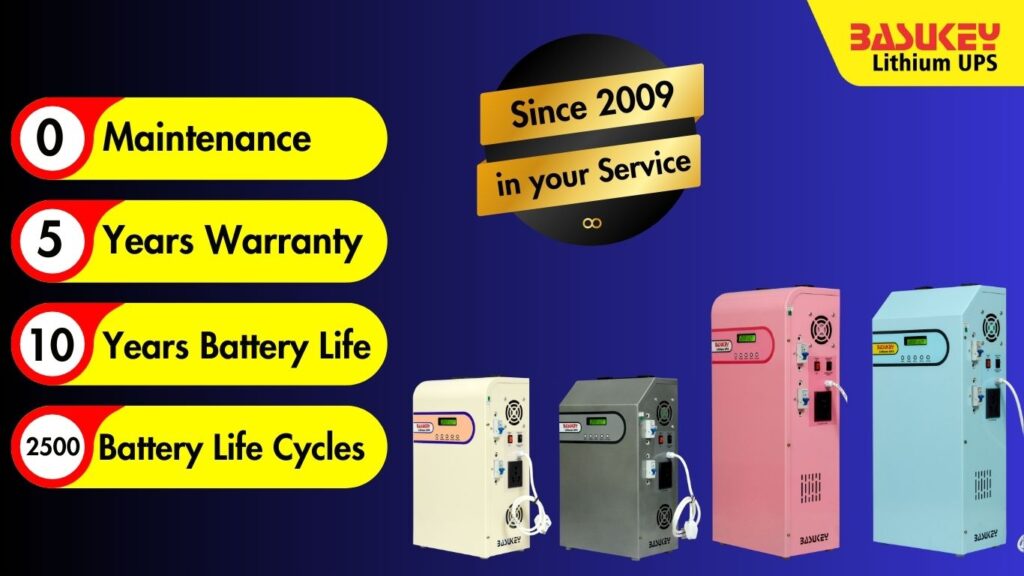The Brain Behind the Backup: How Smart Lithium UPS Adapts to Power Demands
The Brain Behind the Backup: How Smart Lithium UPS Adapts to Power Demands. In today’s fast-paced, digitally connected world, power outages can disrupt businesses, halt industrial operations, and compromise critical systems. Uninterruptible Power Supply (UPS) systems have long been a safeguard against these disruptions, but traditional backup power solutions are reactive and limited in efficiency. Now, with the emergence of Smart Lithium UPS, power backup is evolving from a passive system to an intelligent energy management hub. These next-generation UPS systems learn, adapt, and optimize power delivery in real time, ensuring seamless operations and energy efficiency like never before.
What Makes a Lithium UPS ‘Smart’?
Unlike conventional UPS systems that simply switch to battery power during an outage, Smart Lithium UPS systems are equipped with advanced energy intelligence. They do more than just store energy—they actively monitor, analyze, and adjust power distribution to meet varying demands.

Key features include:
1. Real-Time Adaptive Power Management
Smart Lithium UPS systems use dynamic load balancing to allocate energy based on priority, ensuring critical systems receive uninterrupted power. These systems can:
- Predict fluctuations in energy demand and proactively adjust power output.
- Prevent energy waste by directing power only where it’s needed.
- Smooth out voltage irregularities, protecting sensitive equipment.
2. AI-Driven Predictive Maintenance
Gone are the days of unexpected battery failures. Smart Lithium UPS systems utilize machine learning algorithms to:
- Continuously assess battery health and predict potential failures.
- Alert users when maintenance or replacements are needed, avoiding costly downtime.
- Self-optimize charging cycles to extend battery lifespan and efficiency.
3. Seamless Integration with Renewable Energy & the Smart Grid
With the increasing adoption of solar and wind energy, a Smart Lithium UPS can:
- Store excess renewable energy and distribute it during peak demand.
- Sync with the smart grid to draw or feed power based on energy pricing.
- Operate in hybrid mode, reducing dependence on fossil-fuel-based generators.
4. Ultra-Fast Response Time & Power Switching
Traditional UPS systems experience a slight delay during power transitions. Smart Lithium UPS units, however, can:
- Switch instantaneously to battery mode, preventing micro-outages.
- Maintain continuous uptime for mission-critical industries like healthcare, IT, and manufacturing.
- Offer faster recharge rates, reducing downtime between power events.
Industries That Benefit from Smart Lithium UPS
1. Data Centers & IT Infrastructure
- Prevents server crashes and data corruption during outages.
- Ensures cloud computing services remain online without disruption.
- Reduces energy costs with automated power optimization.
2. Healthcare & Emergency Services
- Keeps life-support systems and medical devices running without interruption.
- Offers fail-proof power switching for critical hospital operations.
- Provides real-time monitoring to ensure power reliability in emergency rooms.
3. Industrial Automation & Smart Factories
- Protects against voltage fluctuations that damage robotics and machinery.
- Supports just-in-time manufacturing by ensuring smooth production lines.
- Enhances overall energy efficiency, reducing operational costs.
4. Commercial & Smart Buildings
- Supports IoT-powered energy management, reducing electricity bills.
- Ensures elevators, security systems, and HVAC remain operational.
- Integrates with building automation systems for seamless energy control.
Why the Future of Power Backup is Smart & Adaptive
Smart Lithium UPS systems are more than just a backup—they’re an energy intelligence system that adapts, learns, and optimizes power management in real time. By harnessing AI, predictive analytics, and renewable energy integration, businesses can:
a. Cut costs on energy waste and battery replacements.
b. Achieve better sustainability by reducing dependence on fossil fuels.
c. Ensure 24/7 uninterrupted power with self-healing capabilities.
